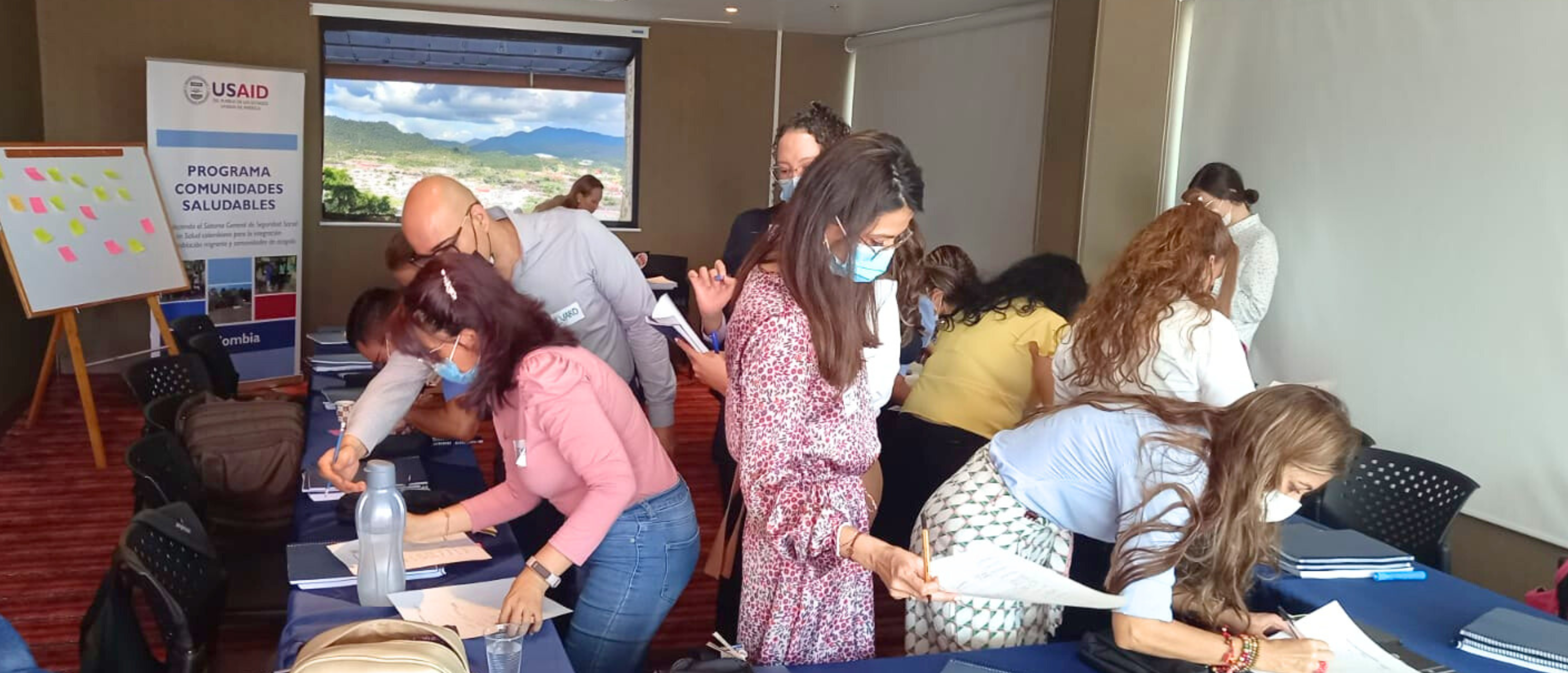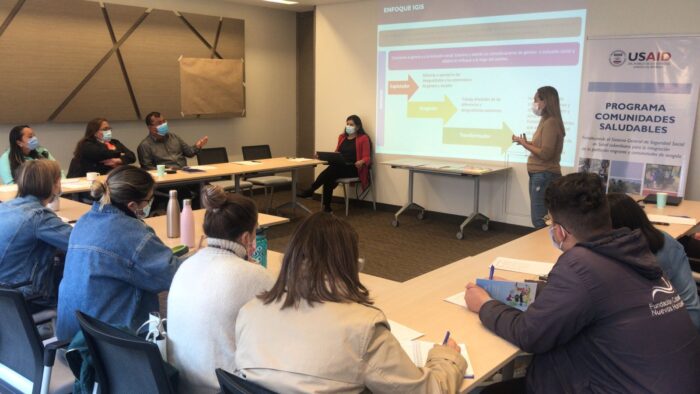
Strengthening Public Health Policy: Incorporating Gender and Social Inclusion into Colombia’s Health and Migration Policies
Colombia has experienced an influx of migrants driven by the political and economic turmoil plaguing neighboring Venezuela. Since 2014, between 7-8 million Venezuelans have fled their country due to insecurity, violence, government instability, and resource shortages, including food staples and medical supplies. Around 2 million people—roughly a quarter of those who have fled Venezuela—have sought refuge in Colombia.
Migration has had a significant impact on Colombian society and its public health system. Data demonstrate that more male migrants than female migrants are enrolled in Colombia’s health system, but more female migrants than male migrants are enrolled in its subsidized plan, reflecting the lack of employment among women in the formal sector. Discrimination towards the migrant population within the health sector has also increased for several reasons, one factor likely being the sharp rise in burn-out rates among health care professionals due to the COVID-19 pandemic— a phenomena that is currently occurring throughout the world. This “compassion fatigue,” combined with a general lack of awareness about human rights regulations, and differences in socio-cultural norms contributes to the level of discrimination faced by people migrating. In addition, migrant women and girls face increased risk of gender-based violence (GBV) due to existing gender inequalities, which the already overburdened health and social services system struggles to address.

Representatives from community-based organizations participate in a Banyan Global-led GESI training in Bogota.
In response to the increased migration from Venezuela, the Colombian government is implementing a number of measures to address the health needs of the migrant community, including developing and revising health policies, which provide the framework that ensures the wellness of the entire population, including those facing vulnerability. The United States Agency for International Development (USAID) is supporting this effort through the Local Health System Sustainability (LHSS) project, which works to improve migrating people’s access to health services and to address the increasing need within the health system. As a subcontractor on LHSS, Banyan Global integrates gender equality and social inclusion (GESI) considerations into its programming, including strengthening health policies.
To address the health and social service needs of people migrating from Venezuela as well as those already in Colombia, it is imperative that health policies are inclusive of the entire population. Banyan Global conducted a GESI analysis under LHSS to support the Colombian government to strengthen GESI considerations in several important health policy instruments, including The Health Roadmap for the Inclusion of the Venezuelan Migrant Population in the General Social Security Health System within the framework for the Temporary Statute for the Protection of Venezuelans, the second iteration of Colombia’s Ten-Year Public Health Plan (2022-2031), and the National Migration and Health Observatory database. This work and our impact are highlighted below.
Gender and Social Inclusion and Health Policy Development
Incorporating a GESI lens in national health policies helps ensure that the migrant community, especially women, can access health information and quality services that meet their needs. Banyan Global initiated its programming in Colombia by conducting a GESI analysis to identify migrant-specific health needs, particularly those affecting women and girls. This analysis examined the vulnerabilities that are increased by gender inequality and intersecting factors such as ethnic belonging, disability, age, sexual orientation, and gender identity. Banyan Global then used the data from this analysis to inform its support in strengthening health policy.
Roadmap for the Inclusion of the Venezuelan Migrant Population in the General Social Health Insurance System (2022)
The government of Colombia developed the Roadmap to outline the steps that should be taken by health system actors to include the Venezuelan migrant population in the Colombian social health insurance system. Banyan Global’s GESI specialists supported the Ministry of Health and Social Protection in more than ten meetings to ensure an explicit GESI focus in the Roadmap. Through this collaboration, our GESI specialists encouraged the use of inclusive language and GESI approaches throughout the Roadmap and ensured that the migrant population’s specific health needs would be prioritized by the health system alongside other groups facing vulnerabilities, such as indigenous peoples, the Afro-descendant population, people with disabilities, and the LGBTQI+ population. The Roadmap was approved in August 2022 through an administrative act of the Ministry of Health and Social Protection.
Ten-Year Public Health Plan (2022-2031)

With the support of LHSS Colombia, a group of migrant community members meet with Colombia’s Ministry of Health to discuss barriers to health care in Bogota.
The second iteration of Colombia’s Ten-Year Public Health Plan establishes the objectives, strategies, and goals to face the country’s public health challenges aimed at guaranteeing the right to health. Working under LHSS Colombia, Banyan Global encouraged GESI integration into this plan by supporting the Ministry of Health and Social Protection to better engage with the migrant population. This engagement strategy included eight meetings with migrant communities so that the Ministry of Health and Social Protection could better understand their health needs, challenges, and perceived barriers to health care. Key findings from the meetings revealed, for example, that migrants need more timely and clear information about how to access the health system in Colombia, and that xenophobia within the health sector needs to be addressed to improve the migrant community’s access to health care services.
This engagement strategy contributed to the development of the Ten-Year Public Health Plan, adopted in July 2022, which identified the migrant population as a priority group for the first time and highlighted the importance of including GESI considerations within the health system.
National Migration and Health Observatory Database
The National Migration and Health Observatory is a database focused on systematic data collection and analysis of the health situation for the migrant population in Colombia, which facilitates knowledge-sharing and institutional collaboration to assist in public health policy decision-making. The Observatory has tracked data since 2019 and under LHSS Colombia Banyan Global advocated for the integration of GESI variables into its data collection. Banyan Global recommended that the Migration and Health Observatory broaden the characterization of the migrant population, including variables such as ethnicity and disability; collect sexual and reproductive health information both for men and women; and to collect information regarding mental health both for men and women, among others. This advocacy helped the government of Colombia to identify gaps in knowledge, such as a lack of information about the health conditions of women migrating and the prevalence of GBV in the migrant population. LHSS Colombia, with the support of Banyan Global, will continue to assist the Observatory in strengthening its capacity to ensure that data focused on specialized areas of health and migration include a GESI approach for evidence-based decision-making.
Moving Forward
Banyan Global’s participation in the successful incorporation of GESI into public health policy in Colombia demonstrates that sensitizing governments to GESI issues can have a profound impact on public policy. Despite clear progress, however, challenges to incorporating GESI into the health sector in Colombia continue. This is due to a lack of awareness, high turnover of health officials, competing needs, and limited resources. Continuous capacity strengthening on the importance of GESI is crucial across the health sector, and LHSS Colombia with the support of Banyan Global continues to work closely with the Ministry of Health and Social Protection to ensure that GESI remains a priority.
Our experience and success in integrating GESI into Colombia’s three public policy instruments on migration and health can also serve as a model for similar efforts to promote the inclusion of populations facing vulnerability in public policy. The related report written by Banyan Global and produced by the USAID LHSS Colombia project, Integration of Gender Equality and Social Inclusion Approaches in Technical Assistance Processes for the Formulation of Public Policies in Health and Migration, outlines best practices, lessons learned, challenges, and practical recommendations for including GESI in public policy processes and documents in Colombia and other country contexts.
